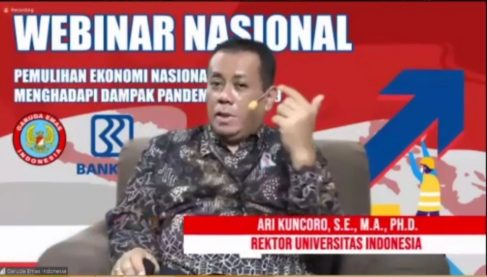UI Rector at Garuda Emas Indonesia’s Webinar, “National Economic Recovery to Deal with Impacts of Covid-19 Pandemic”
Nino Eka Putra ~ FEB UI Public Relations Officer
DEPOK – (10/9/2020) Universitas Indonesia Rector Professor Ari Kuncoro served as speaker at a webinar held by Garuda Emas Indonesia entitled “National Economic Recovery to Deal with the Impacts of Covid-19 Pandemic”, Thursday and Friday (10-11/9/2020).
Professor Ari Kuncoro said that the survival policy adopted by the government to deal with the Covid-19 pandemic is aimed at maintaining the momentum of the third and fourth quarters of 2020, and a signal for clinical trials of a Covid-19 vaccine. To achieve zero percent or higher growth in 2020, significant positive growth is crucial, which is possible if the new normal is accompanied by a clean and healthy life behavior.

In addition, there are two domestic push factors, namely consumer spending and government expenditure. The prospects for export are still low, pending positive economic growth in trading partner countries.
Signaling the direction of the 2021 state budget, the Ministry of Public Works and Housing is allocated a budget of Rp115.56 trillion, up 52.82 percent. The ministry will seek to increase public mobility by improving infrastructure to facilitate physical interaction and enhance food resilience by building and repairing irrigation systems. To complement the budget allocated to the Ministry of Public Works and Housing, the Ministry of Transportation is allocated Rp41.3 trillion, an increase by 26.9 percent, to strengthen mobility. Productive social assistance for household-based micro and small-scale businesses is set at Rp2.4 million per household to maintain the supply chain in the SME sector. Meanwhile, workers in the formal sector will receive a transfer payment of Rp600,000 per month for a specific length of time.
“The national economic recovery program is aimed at reviving the supply side or the production capacity of the economy with the demand side while injecting new purchasing power into the national revenue cycle. Besides the Ministry of Public Works and Housing, the Ministry of Transportation, the Ministry of Communications and Informatics, the Ministry of State-owned Enterprises and the Ministry of Villages, Development of Disadvantaged Regions and Transmigration are system integrators. The Ministry of State-owned Enterprises that oversees state logistics body BULOG, transportation, infrastructure and financing is also a system integrator. In addition, the Ministry of Villages, Development of Disadvantaged Regions and Transmigration can facilitatge MSMEs, especially in villages, including through the digitalization of the city-village supply chain to support economic recovery because 63% of the GDP is contributed by this sector,” said Ari.
“The new habits acquired by the middle income group, such as the biking trend in a number of cities, can serve as a basis for the national economic recovery program in the third and fourth quarters of 2020. The new trend has left a positive impact on the trade and manufacturing sectors resulting from a growing demand for sports attires, health supplements (vitamins), and sports equipment. For the tourism sector, the new habits could create demand for new, customized services from nuclear or big families as the customer base. The new tourism services also ensure health, privacy and the social nature of humans,” Ari said to conclude his session. (hjtp)
(lem)



